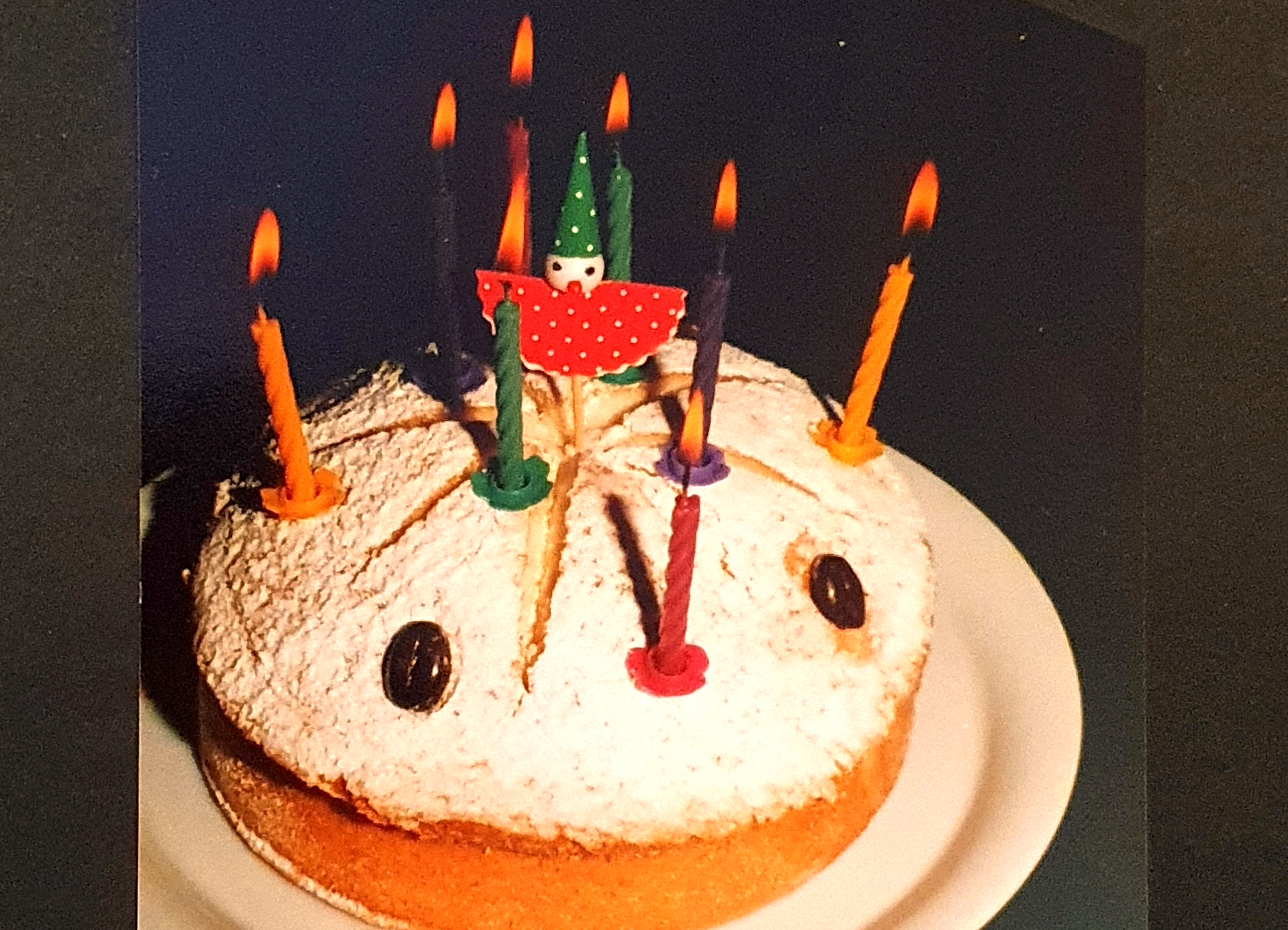WEST GERMANIC
Being "yeary"
Linguistics
| 12-12-2020
"Wanneer ben jij jarig?" In Dutch, this is a very normal question. Yet it is something very special and something uniquely Dutch. You will never be asked that question in another language, for the simple reason that the word "jarig" doesn't exist in other languages, not even in languages closely related to Dutch.

Today am I birthday
That jarig zijn is a way of saying that only occurs in Dutch, I first noticed when I learned to speak Frisian. When it's your birthday, you can say in Frisian hjoed is it myn jierdei ("today it is my birthday"), and under the influence of Dutch you sometimes hear a corruption like hjoed bin ik jierdei ("today I am birthday"), but it doesn't need any explanation that that's not "Standard Frisian". But hjoed bin ik jierrich is not an existing way of saying, although it could very well be. In English then? It’s my birthday. In German? Es ist mein Geburtstag. Luxembourgish? Et ass mäi Gebuertsdag. Perhaps in Afrikaans, which originated from Dutch? Dit is my verjaarsdag.. Either I am not well informed, or jarig zijn is really a unique Dutch way of expressing.
Tweejarig and overjarig
The word jarig is not only used in Dutch to indicate that it is someone's birthday, but also to indicate an age. This can be very specific, with a number, as in een tweejarig kind ("a two-year-old child"), or less specifically, as in overjarige kaas ("aged cheese"). The first case can also be found in other languages, but other words are used for the cheese to indicate the long ripening. In a number of languages that I can make something of, with a little help from Google Translate, it looks like this:
Jarig as neologism
The word jarig is so common in Dutch that I, as a native Dutchman, would miss that word in another language, and I'm probably not alone in that. The translations of tweejarig above show that many languages have a word for it. So jarig could very well be a useful neologism in those languages. For example:
Birth or year
To conclude, for those who like it, an overview of the languages that depart from birth versus the languages that take a word for year as a starting point. There are several languages that use a word with a translation of birth for what we call a verjaardag in Dutch that also have a word that contains a word for year, but the latter is often a translation of the English anniversary, which in Dutch can also be translated as jubileum ("jubilee") or gedenkdag ("commemoration day"). In Dutch we know both geboortedag (geboorte = birth) and verjaardag (jaar = year), but in a slightly different meaning than in most other languages, as far as I can see*: geboortedag (the literal translation of "birthday") is more common when commemorating or celebrating that day of someone who has died, for example a celebrity, while verjaardag is mainly used for someone who has a birthday and can still join the party themselves.

Today am I birthday
That jarig zijn is a way of saying that only occurs in Dutch, I first noticed when I learned to speak Frisian. When it's your birthday, you can say in Frisian hjoed is it myn jierdei ("today it is my birthday"), and under the influence of Dutch you sometimes hear a corruption like hjoed bin ik jierdei ("today I am birthday"), but it doesn't need any explanation that that's not "Standard Frisian". But hjoed bin ik jierrich is not an existing way of saying, although it could very well be. In English then? It’s my birthday. In German? Es ist mein Geburtstag. Luxembourgish? Et ass mäi Gebuertsdag. Perhaps in Afrikaans, which originated from Dutch? Dit is my verjaarsdag.. Either I am not well informed, or jarig zijn is really a unique Dutch way of expressing.
Tweejarig and overjarig
The word jarig is not only used in Dutch to indicate that it is someone's birthday, but also to indicate an age. This can be very specific, with a number, as in een tweejarig kind ("a two-year-old child"), or less specifically, as in overjarige kaas ("aged cheese"). The first case can also be found in other languages, but other words are used for the cheese to indicate the long ripening. In a number of languages that I can make something of, with a little help from Google Translate, it looks like this:
| Dutch | ik ben jarig | een tweejarig kind | overjarige kaas |
|---|---|---|---|
| Afrikaans | dit is my verjaarsdag | 'n tweejarige kind | verouderde kaas |
| Danish | det er min fødselsdag | et to-årigt barn | ældet ost |
| English | it's my birthday | a two-year-old child | aged cheese |
| French | c'est mon anniversaire | un enfant de deux ans | fromage affiné |
| Frisian | it is myn jierdei | in twajierrich bern | oerjierrige tsiis |
| German | es ist mein Geburtstag | ein zweijähriges Kind | gereifter Käse |
| Italian | è il mio compleanno | un bambino di due anni | formaggio stagionato |
| Luxembourgish | et ass mäi Gebuertsdag | en zwee Joer aalt Kand | geeschtege Kéis |
| Norwegian | det er min bursdag | et to år gammelt barn | alderen ost |
| Portuguese | é meu aniversário | uma criança de dois anos | queijo envelhecido |
| Spanish | es mi cumpleaños | un niño de dos años | queso curado |
| Swedish | det är min födelsedag | ett tvåårigt barn | åldrad ost |
Jarig as neologism
The word jarig is so common in Dutch that I, as a native Dutchman, would miss that word in another language, and I'm probably not alone in that. The translations of tweejarig above show that many languages have a word for it. So jarig could very well be a useful neologism in those languages. For example:
| Dutch | ik ben jarig |
|---|---|
| Afrikaans | *ek is jarig |
| Danish | *jeg er årigt |
| English | *I am yeary |
| Frisian | *ik bin jierrich |
| German | *ich bin jährig |
| Luxembourgish | *ech sinn joerech |
| Norwegian | *jeg er årig |
| Swedish | *jag är årigt |
Birth or year
To conclude, for those who like it, an overview of the languages that depart from birth versus the languages that take a word for year as a starting point. There are several languages that use a word with a translation of birth for what we call a verjaardag in Dutch that also have a word that contains a word for year, but the latter is often a translation of the English anniversary, which in Dutch can also be translated as jubileum ("jubilee") or gedenkdag ("commemoration day"). In Dutch we know both geboortedag (geboorte = birth) and verjaardag (jaar = year), but in a slightly different meaning than in most other languages, as far as I can see*: geboortedag (the literal translation of "birthday") is more common when commemorating or celebrating that day of someone who has died, for example a celebrity, while verjaardag is mainly used for someone who has a birthday and can still join the party themselves.
| *birth* | *year* | |
|---|---|---|
| Afrikaans | - | verjaarsdag |
| Czech | narozeniny | výročí |
| Danish | fødselsdag | - |
| Dutch | geboortedag | verjaardag |
| English | birthday | anniversary |
| Esperanto | naskiĝtago | - |
| French | - | anniversaire |
| Frisian | - | jierdei |
| German | Geburtstag | Jahrestag |
| Italian | - | compleanno |
| Luxembourgish | Gebuertsdag | Joresdag |
| Norwegian | fødselsdag/bursdag | - |
| Portuguese | - | aniversário |
| Romanian | zi de nastere | aniversare |
| Scottish Gaelic | co-là-breith | ceann-bliadhna |
| Slovak | narodeniny | výročie |
| Slovenian | rojstni dan | obletnica |
| Spanish | - | cumpleaños |
| Swedish | födelsedag | årsdag |
WEST GERMANIC
In the West Germanic section, I regularly discuss a word that strikes me. I look at the meanings and forms of the word, and especially at where the word originates from. With that I compare the four West Germanic languages Dutch, English, Frisian and German, with the occasional inevitable trip across the fictional West Germanic border.
*Found a mistake? Let me know on Twitter.
Sources
- Etymological dictionaries: etymologiebank.nl, dwds.de, etymonline.com.
- The Wurdboekportaal at Taalweb Frysk.
- Much of the translations in the tables: Google Translate.
- Image: from own archive.
